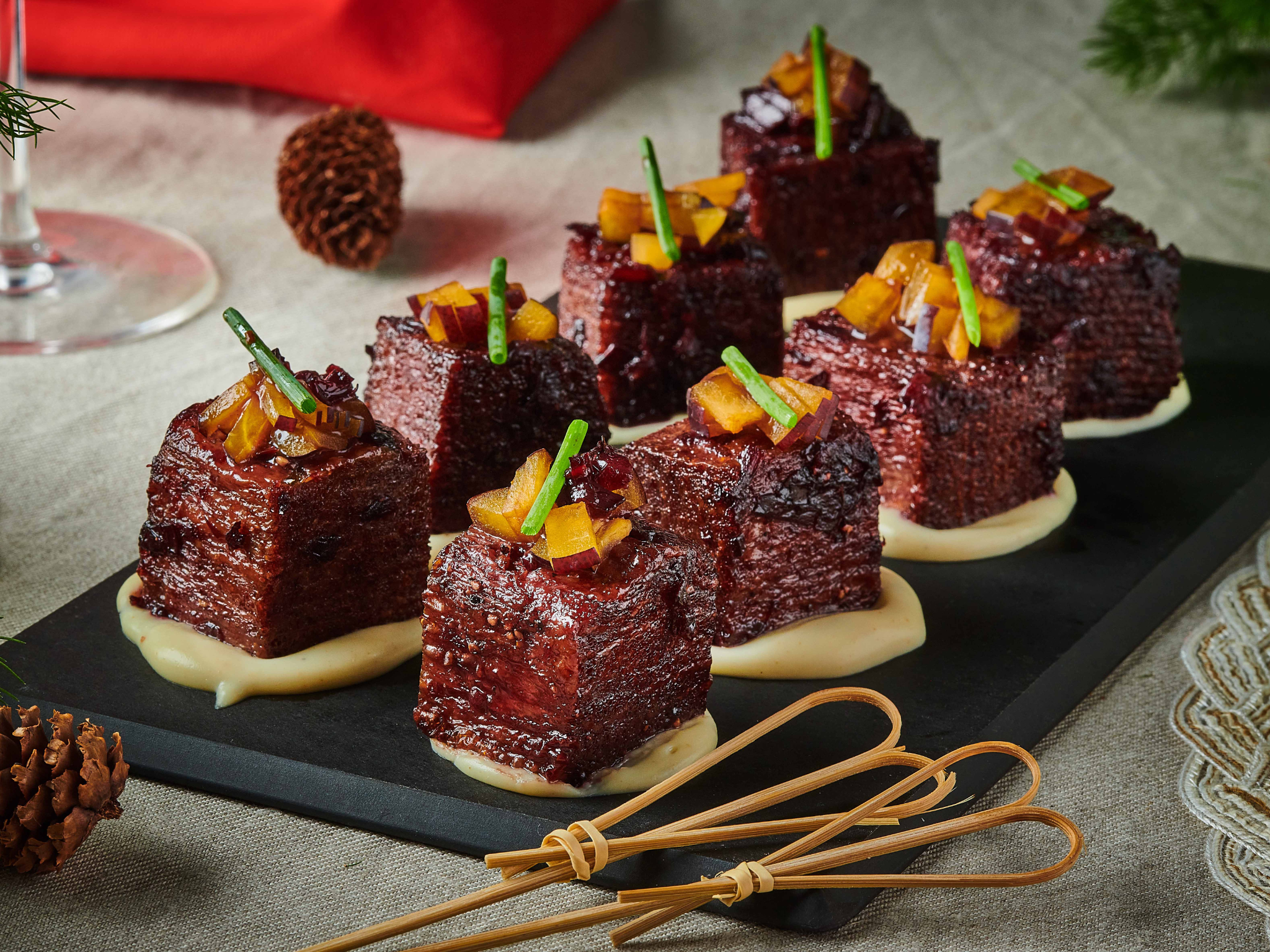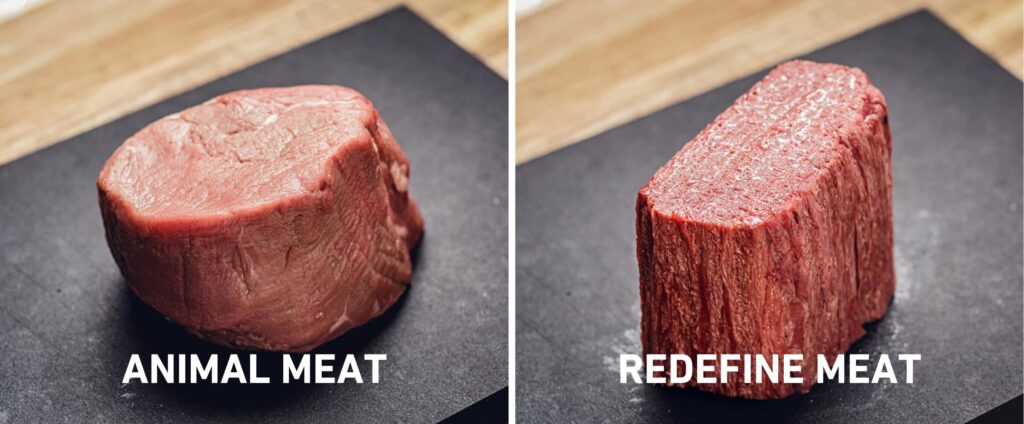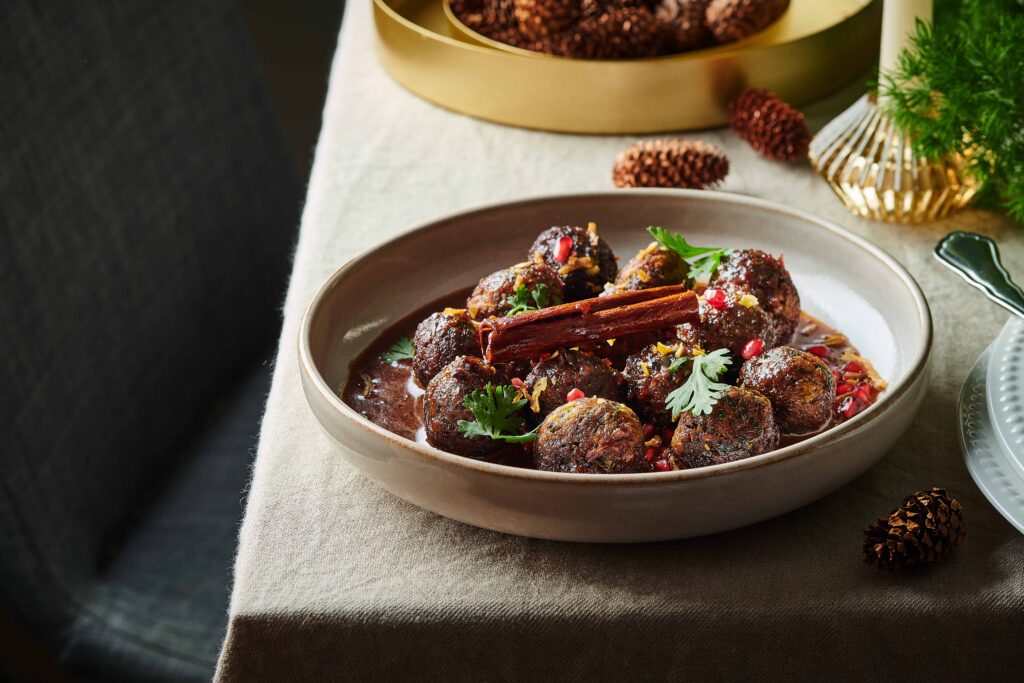
Thanks to a collaboration with Greene King, Redefine Meat’s 3D-printed meat alternatives are now available at 1,000 UK restaurants, in a year when domestic sales have shot up by 100%.
Israeli food tech startup Redefine Meat is capping off a “record year” with a listing at Greene King, a 225-year-old British pub chain, which will serve its premium vegan flank steak at 70 sites.
It marks the 3D-printed meat innovator’s availability at 1,000 restaurant locations in the UK, where its foodservice sales have nearly doubled this year. At the same time, the company’s year-on-year revenue at Ocado – its first retail listing in the country – has grown by 150%.
“Celebrating our 1000th UK site through our new Greene King partnership, we believe we’ve hit a major milestone for the UK foodservice industry – one where high-quality plant-based options that taste delicious, are increasingly becoming a mainstream consumer preference,” says Simon Owen, Redefine Meat’s UK managing director.
Redefine Meat’s tech has left chefs and customers impressed

One of the best-known plant-based companies, Redefine Meat markets its 3D-printed products as New Meat, with a diverse range of beef, pork and lamb alternatives that are available in formats like pulled, mince, sausages, burgers, and whole cuts. They can be found at over 4,000 foodservice locations in 10 countries, plus retailers in several European markets.
Its flagship product is the Beef Flank, positioned as a premium, chef-led whole-cut steak. It’s made from a base of wheat, soy and potato protein, complemented by soy and wheat flours, rapeseed oil, cornstarch, natural flavourings, maltodextrin, barley malt, salt, and colourings.
Redefine Meat’s products undergo a patented additive manufacturing process – more commonly known as 3D printing – at a factory in the Netherlands, which gives them a meatier flavour and the fibrous texture so devoured by meat-eaters. It calls the process ‘Plant-Based Tissue Engineering’, a reference to how it disintegrates textured vegetable protein (TVP) into fibres and blends them with a dough made from soy or pea protein isolates.
“This approach allows the projection of the meat-like texture of TVP, but in a flexible manner, and in a scalable manner,” the company explained in a white paper in February. “The muscle component is reassembled to mimic the anisotropic fibrous structure of beef, while the fat component is engineered through lipid encapsulation within a hydrocolloid matrix.”
For Europeans, taste is the major driver of plant-based meat, with 53% saying so in a 10-country survey last year. And in the UK, 51% of consumers say flavour and texture are the main reasons why they’re cutting back on meat alternatives, with 66% feeling products from some brands taste much worse than others.
But Redefine Meat’s plant-based flank steak has been endorsed by leading chefs like Marco Pierre-White and Ron Blaauw, and is said to have won plaudits from consumers of all dietary preferences.
“We’ve found that chefs really value the ability to co-develop New Meat products with us, something we’re not seeing with other plant-based suppliers,” notes Owen. “This enables us to respond to their customer’s specific preferences, whether that’s elevating existing plant-based menus, or introducing foodservice locations to the category for the first time.”
Capitalising on the foodservice demand for plant-based

Redefine Meat argues that the whole-cut vegan steak offers Greene King a new market and key competitive advantages through product quality and service versatility. The Beef Flank alone is now featured on the menus of 200 UK restaurant sites, including Albion, Gusto, Dirty Vegan Burgers, and Stonegate Group, the country’s largest pub chain.
“Over the last 12 months, we’ve seen an important shift in the global foodservice industry with many iconic brands transitioning their plant-based menus to more premium-quality options,” says Owen.
In the Netherlands, for example, volume sales of meat analogues in foodservice increased by 111% between 2021 and 2023, against a 2% decline for conventional meat in the same period. And in the US, a market Redefine Meat is yet to enter, foodservice pound sales of plant proteins were 25% higher than pre-pandemic levels last year, with half of these attributed to vegan meats that replicate the taste, texture and experience of animal proteins.
This is why whole cuts have been called the “holy grail” of meat analogues, a space crowded by startups like Juicy Marbles (Slovenia), Libre Foods (Spain), Green Rebel (Indonesia), Revo Foods (Austria), Project Eaden (Germany), and Planted (Switzerland), among others.
“Having broken through the quality barrier of the plant-based industry, we began our journey in fine dining and Michelin-star restaurants ensuring a superior ‘eating’ experience,” says Owen.
“In transitioning to retail, this top-down approach has also been crucial to ensuring our differentiation by bringing chef-quality New Meat directly to consumers. As is the ability to give foodservice leaders like Greene King access to a diverse product range beyond just minced-based products, but also pulled meats and whole cuts,” he continues.
“In the UK, we’re ready to support this local growth thanks to our large-scale state-of-the-art facility in the Netherlands. For customers such as Greene King, this facility ensures that as the market grows, they know that we can meet their requirements.
“While the overall plant-based market has gone through a challenging period of consolidation, 2024 has been a year of strong growth for Redefine Meat, and we’re excited for the year ahead.”
The post Redefine Meat Doubles UK Sales, Partners with 200-Year-Old Pub Chain for 3D-Printed Meat appeared first on Green Queen.
This post was originally published on Green Queen.